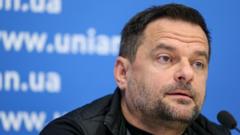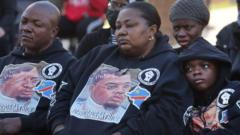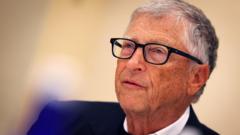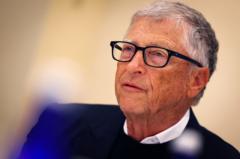Dmytro Sherembey, a Ukrainian advocate for HIV patients, fears for his life as impending cuts to USAID threaten lifesaving medical services. The agency’s crucial role in global health, education, and humanitarian aid faces doubt amid U.S. political shifts, showcasing a deeper conversation on the implications of foreign assistance.
Uncertainty Surrounds USAID: A Lifeline at Risk for Millions

Uncertainty Surrounds USAID: A Lifeline at Risk for Millions
As the future of the U.S. Agency for International Development hangs in the balance, voices from around the world highlight the critical impact of its services on vulnerable populations.
In the heart of the global debate surrounding foreign aid, Dmytro Sherembey, a 24-year survivor of HIV in Ukraine, asserts, "I'm alive thanks to USAID." Sherembey speaks from experience, emphasizing that the United States Agency for International Development (USAID) has played a pivotal role in identifying HIV-positive individuals in Ukraine, stating that “every second HIV-positive person in Ukraine was identified thanks to this program.” However, the future of such support remains uncertain, especially following actions from U.S. leaders like former President Donald Trump, who previously labeled USAID as ineffective and rife with corruption, though he provided no substantive evidence.
Sherembey leads the patient-led organization 100% Life and recalls the traumatic events following Russia's invasion of Ukraine in 2022, noting that warehouses containing vital HIV medications came under attack, necessitating immediate aid from USAID to secure replacements. He passionately argues that the withdrawal of this support could be a death sentence for many, stating that access to essential medications isn't guaranteed without external assistance.
USAID, established by President John F. Kennedy in 1961, operates with a budget of nearly $40 billion, providing crucial resources across more than 60 countries. Its vast array of operations includes not only health initiatives but also agricultural support and famine prediction systems. This breadth emphasizes the importance of USAID’s programs in areas with critical needs.
The agency's potential cuts have sparked significant public concern, leading to protests outside its headquarters in Washington, D.C. Activists warn of dire consequences; for instance, in Afghanistan, USAID represents a significant share of funding for maternal and child health services. One doctor involved in USAID-funded projects reveals that over 60 healthcare workers have been sent home due to funding freezes, warning that without these services, maternal mortality rates are expected to rise alarmingly.
The potential reduction of USAID's contributions would ripple outwards; activists in Iran who receive USAID funding for anti-censorship projects also express concern, stating that crucial operations defending human rights and free speech are at stake. Meanwhile, students in Egypt dependent on USAID scholarships articulate their fears over an uncertain academic future as funding hangs by a thread.
While Trump’s critiques stem from a long-standing skepticism toward foreign spending as a whole, it remains unclear if major dismantling efforts could come to fruition without Congressional support. Reports indicate that proposals are being discussed to merge USAID with the Department of State, raising questions about the agency’s operational future.
For Sherembey and countless others reliant on USAID's support, the looming possibility of losing this lifeline is devastating. "If my hospital runs out of this medication, I will have to search for it elsewhere," he warns, highlighting the dire positions those in similar conditions face in Ukraine. The scenario speaks to a larger narrative regarding the role of U.S. foreign aid in protecting and enhancing lives around the globe, making it imperative to consider the human impact of policy changes.
Sherembey leads the patient-led organization 100% Life and recalls the traumatic events following Russia's invasion of Ukraine in 2022, noting that warehouses containing vital HIV medications came under attack, necessitating immediate aid from USAID to secure replacements. He passionately argues that the withdrawal of this support could be a death sentence for many, stating that access to essential medications isn't guaranteed without external assistance.
USAID, established by President John F. Kennedy in 1961, operates with a budget of nearly $40 billion, providing crucial resources across more than 60 countries. Its vast array of operations includes not only health initiatives but also agricultural support and famine prediction systems. This breadth emphasizes the importance of USAID’s programs in areas with critical needs.
The agency's potential cuts have sparked significant public concern, leading to protests outside its headquarters in Washington, D.C. Activists warn of dire consequences; for instance, in Afghanistan, USAID represents a significant share of funding for maternal and child health services. One doctor involved in USAID-funded projects reveals that over 60 healthcare workers have been sent home due to funding freezes, warning that without these services, maternal mortality rates are expected to rise alarmingly.
The potential reduction of USAID's contributions would ripple outwards; activists in Iran who receive USAID funding for anti-censorship projects also express concern, stating that crucial operations defending human rights and free speech are at stake. Meanwhile, students in Egypt dependent on USAID scholarships articulate their fears over an uncertain academic future as funding hangs by a thread.
While Trump’s critiques stem from a long-standing skepticism toward foreign spending as a whole, it remains unclear if major dismantling efforts could come to fruition without Congressional support. Reports indicate that proposals are being discussed to merge USAID with the Department of State, raising questions about the agency’s operational future.
For Sherembey and countless others reliant on USAID's support, the looming possibility of losing this lifeline is devastating. "If my hospital runs out of this medication, I will have to search for it elsewhere," he warns, highlighting the dire positions those in similar conditions face in Ukraine. The scenario speaks to a larger narrative regarding the role of U.S. foreign aid in protecting and enhancing lives around the globe, making it imperative to consider the human impact of policy changes.





















